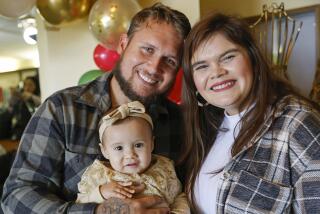Russia Communists Forge Uneasy Alliance : Politics: Yesterday’s Soviet leaders caucus to plan for tomorrow, but true unity is elusive.
Hundreds of Russian Communists, yesterday’s elite now searching for a tomorrow, caucused at a vacation home in the woods north of Moscow over the weekend but found it easier to condemn their opponents than to unify their own ranks.
The new party founded during the two-day meeting, the Communist Party of the Russian Federation, will likely enlist people from only two of myriad existing Communist factions, the Union of Communists and the social-democratic Socialist Workers Party, participants said.
Other Marxist-Leninist groups, including the neo-Stalinist All-Russian Party of Communists (Bolshevik) and the largest group, the Russian Communist Workers Party, snubbed the “renewal and unity congress,” or sent observers only.
Those who did make the trip to Sorokino, in snow-covered pine woods 10 miles north of Moscow, included seven of the 12 former Soviet Communist leaders accused of trying to seize power in the failed putsch of August, 1991.
On Saturday, congress delegates, most of them men in their 40s and 50s dressed in dark suits, rose from their seats in the auditorium to hail former Soviet Vice President Gennady I. Yanayev, former Soviet Parliament Speaker Anatoly I. Lukyanov and other alleged co-conspirators.
The putsch defendants are to go on trial in April, and their sympathizers called them the first victims of political persecution in President Boris N. Yeltsin’s Russia. But some Communists said they wished the putsch leaders hadn’t come.
“We don’t consider these people criminals, but they aren’t heroes either,” Vladimir Y. Khazanov, a leader of the Russian Party of Communists, an ultra-orthodox grouping that has refused to join the new party, said.
In a snack bar off the auditorium’s lobby, former KGB Chairman Vladimir A. Kryuchkov, another member of the ill-fated State Emergency Committee, as the putsch leaders called themselves, spent much of Sunday morning hunched over a rickety table, signing autographs for admirers.
By the afternoon, the more than 650 congress delegates from across Russia had formally approved a charter for the new party and given it organizational lines largely like the old Soviet Communist Party, which Yeltsin banned after the 1991 putsch.
However, some labels were changed, which delegates said was necessary because of the “devaluation” of the Soviet party’s authority under its last general secretary, Mikhail S. Gorbachev, a man delegates mentioned with scorn as a traitor to the ideals of communism.
Instead of a Central Committee, the new party will have a Central Executive Committee as its policy-making organ. A presidium--not a politburo--will be elected by the committee to steer the party from day to day.
Roy A. Medvedev and his followers in the Socialist Workers Party sought a top leadership body of three people as a way of preventing any individual from gaining too much power. But rank-and-file delegates from the provinces voted overwhelmingly for a single chief secretary.
As of Sunday evening, it appeared that Gennady A. Zyuganov, a former hard-line ideologue in the Russian Communist Party who has now wholeheartedly embraced right-wing Russian nationalist rhetoric, was the best placed candidate.
Valentin A. Kuptsov, a courtly white-haired Communist apparatchik who briefly led the Soviet-era Russian Communist Party before the Yeltsin ban, was another front-runner but was opposed by some delegates as having been an overly willing tool of Gorbachev.
The resulting uneasy blend of Russian Communists put together former managers from the defunct Soviet party with Establishment reformers such as Medvedev. Lukyanov, a leading dignitary of the Soviet past, was nominated for a slot on the Central Executive Committee and appeared to be a shoo-in.
In a draft resolution designed to serve as a stopgap political statement, the new party blasted the “anti-popular” nature of the Yeltsin government and demanded that it halt the “capitalization” of Russia and guarantee each and every Russian enough food to live.
The party charter requires all Communists to carry out party decisions, a duty that dates back to the iron-fisted leadership of V. I. Lenin but also explicitly allows members to criticize “any party organ and any Communist.”
The party also laid formal claim to all property that belonged to the Soviet-era Communist Party, a veritable real estate bonanza of office buildings, vacation resorts and private apartments across Russia.
According to Medvedev, 600,000 of the 10 million people in Russia who used to hold Communist Party cards have now re-registered, so if the new party can capture their loyalty, it will become the single biggest political formation in Russia.
More to Read
Sign up for Essential California
The most important California stories and recommendations in your inbox every morning.
You may occasionally receive promotional content from the Los Angeles Times.










